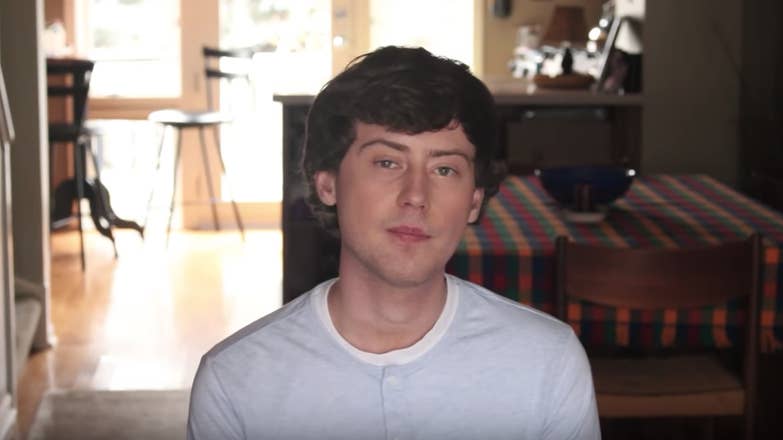
A 23-year-old Russian violinist called Artem Kolesov emailed BuzzFeed News last week with a message that began: “Hello, I know that you receive thousands of emails every day, but I would like to share my story with you.”
He explained that he grew up in a Pentecostal Christian family in rural Russia, that both his parents were pastors, and that he had just come out as gay on YouTube.
“I did it,” he wrote, “Because it breaks my heart to know how many Russian children and other LGBT youth around the world feel like they’re alone”.
Kolesov sent a link to the YouTube video – which he uploaded a day after his birthday – and said he hoped that it might at least help one child.
It detailed the years he spent praying that God would take his homosexuality away, the depression he suffered, the five attempts to kill himself, and his reasons for speaking out now.
He agreed to be interviewed on the phone at first, and then via Skype. It was just days after reports had emerged that the authorities in Chechnya were arresting, imprisoning and murdering gay men.
His video reveals another, invisible kind of prison that exists in Russia for LGBT people – one of silence and fear. In 2013, Russia introduced a vague, far-reaching law, referred to in the West as the “gay propaganda” law that forbids any suggestion to children that homosexuality is normal and that in practice, human rights organisations attest, has muzzled LGBT people across the country.
It has also helped to shut down organisations and websites that try to help sexual minorities and, according to reports, fuelled violence and hostility toward LGBT people. But Kolesov refuses to be silent.
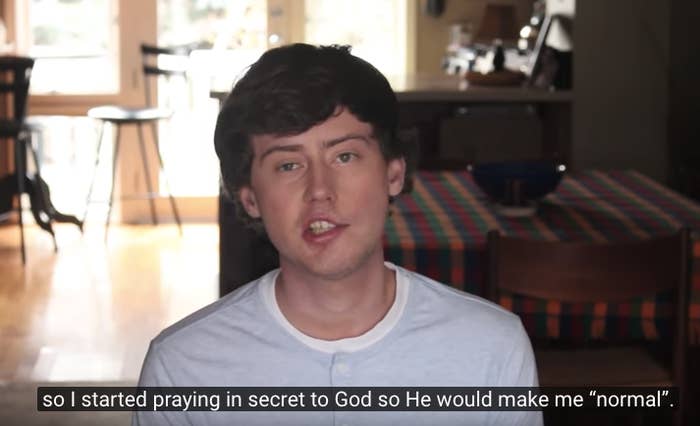
In the video he explains that he knew he liked boys when he was five. “During my entire childhood I heard from my parents and the church that homosexuality is a huge sin,” he says, “so I started praying in secret to God so that he would make me ‘normal’. In my family I often heard that all gays should be destroyed, that they should be bombed, and that if anyone in our family turns out to be gay, my family should kill them with their bare hands.”
Kolesov grew up with his four brothers in Maloyaroslavetz, a town of 5,000 people, an hour outside of Moscow.
“I never heard anything good about gay people,” he says. “All I knew was that gays are the people who everyone should hate. I was scared because I knew that I was gay. I didn’t know anyone who I could talk to about it. It seemed that I was the only gay person in Russia.”
This isolation grew as Kolesov got older and became more involved with the church. “How could I be Christian and be gay at the same time? My self-hatred put me into a deep depression,” he says in the video. Learning the violin from aged six was his only outlet.
“Every night I cried and prayed that God would deliver me. I asked, ‘Lord why me? Why do I have to go through all of this?” In his Pentecostal Church in St Petersburg, Kolesov even signed a petition against a gay pride parade for fear that if he did not others would become suspicious.
He says he asked God if he could die before his mother found out he was gay. He took a vow to never tell anyone. “I never thought I would live to be 23,” he says. But while struggling with depression and amid several suicide attempts, Kolesov realised that he could not put his mother, who had lost another of her sons in a car accident, through more grief.
“One day during my depression I was talking to my friend and he told me that his friend came out to her parents as a lesbian,” he says. “They said that they don’t approve of her ‘lifestyle and she hanged herself…I thought that this could be me.”
Aged 16, after ten years of learning the violin, Kolesov won a full scholarship to attend a music school in Canada. Here, life began to change for him.
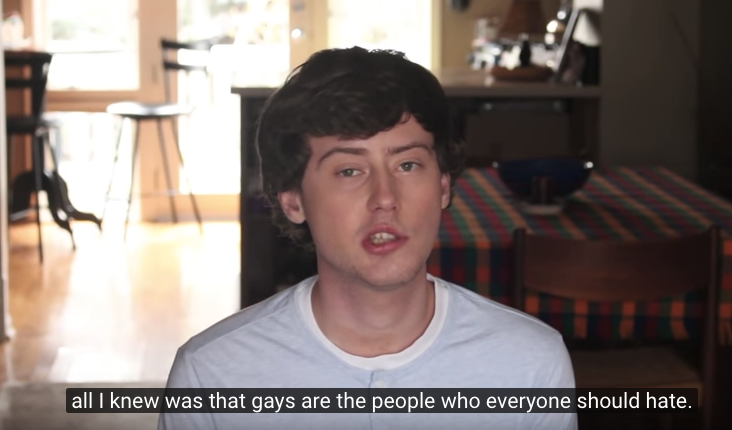
“For the first time in my life I met people who openly lived a full life despite being LGBT,” he says. “The first time I met an openly gay person I started shaking because I know that I am just like him.” Initially, he was still unable to shake off everything he had learned about gay people. “I loathed myself and every LGBT person around me.”
But in a different, more accepting environment, he gradually became stronger, and last month told his mother he was gay shortly before uploading the video. “One of the requests she had for me was not to tell anyone about it,” he says. “She asked me for the same reason as my older brother – they are ashamed to have a gay son and brother.”
It did not deter him. He wants to stop other Russian kids hating themselves and feeling like they’re the only one.
“We don’t come out for heterosexual people to know,” he says. “We don’t come out for the ones who hate us to know. We shout and make as much noise as possible just so other people like us who are scared and can’t be themselves would know that they are not a mistake and they are not alone.”
The anti-propaganda law is, he says, killing people. “I would like to say to the Russian lawmakers that if what I am doing right now is ‘same-sex propaganda’ then what you are doing can be considered ‘encouragement of suicide.’” He ends the film with a single message:
“If you are watching this video and you or someone you know is in a difficult situation, know that I love you and that your happiness is worth living and fighting for.”
Speaking on the phone to BuzzFeed News from Chicago where he now studies violin at the Chicago College of Performing Arts, Kolesov explained what happened shortly after he uploaded the video.
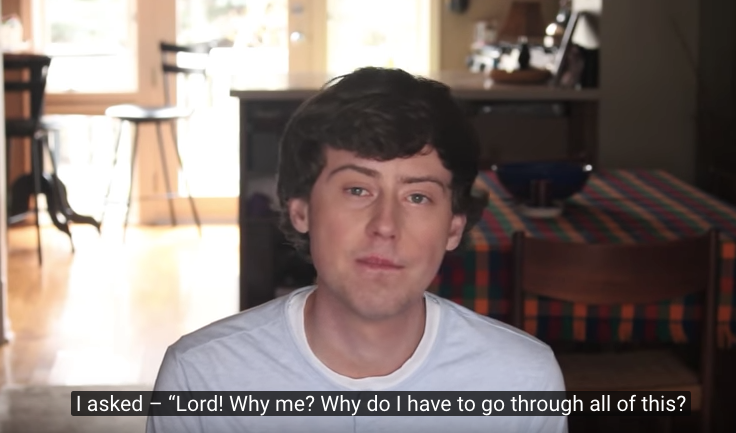
“I took a picture on Instagram and shared it on Facebook as well and shared a link to the video and I wrote, ‘What starts with a ‘g’ and rhymes with ‘yay’? Artem!’ And I said, ‘Dear friends, if you have more questions you can watch this video.’ About 20 minutes after I posted that picture everyone started commenting and saying, ‘I love you, I’m so proud of you.’”
They weren’t only people he knew from the USA and Canada: three Russian friends contacted him. “They let me know that they saw it and they support me. It was incredible.” There was one man in particular whose reaction he was afraid of, whom Kolesov thought would respond with homophobia. “He said, ‘Well I’m gay actually as well.’”
Not all of his friends, in particular those from his church in Canada, were supportive, he said, but for the ones who were, it was worth it.
“I feel more connected to them," he said. "Hiding a part of my identity for so long people didn’t know the real me and I feel like people are finally starting to know me. It’s very liberating.”
Kolesov is not speaking to his family at the moment, however, since coming out to them and posting the video. “Even if I go back to Russia I’m not sure I would be feeling completely safe with my own family,” he said, explaining that although his mother said she loved him, “she thinks there’s something wrong with me; she said it’s not natural, that God doesn’t want it”.
Returning to his motherland now poses the risk of arrest, he said – authorities could deem his YouTube video a breach of the propaganda law. “When I was making the video and editing I found out that a teen in Russia was arrested for joining an LGBT support group.” Such groups are becoming more secretive, he said, as the government clamps down.
Despite the possibility of arrest, he has no regrets, because he says that as well as his own liberation, LGBT Russians will be able to hear him, and the rest of the world will hear the voice of a gay Russian.
“When I was growing up I was isolated from the LGBT community,” he said. “And just hearing anything about LGBT people I realised that maybe if the Russian kids hear about my story maybe they could know that a lot of people are going through the same struggles.”
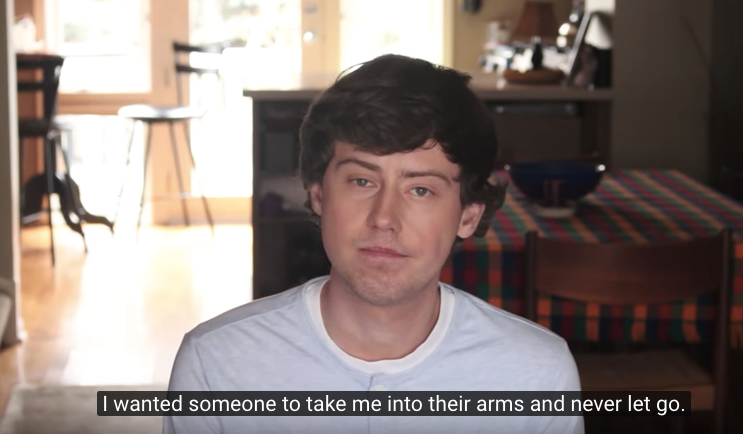
Making the video in Russian with English subtitles was a deliberate choice, he said, so young Russians would relate to his words better. And showing his face was equally important – and rare for a gay Russian, he said – to show that he is not ashamed.
Shortly after uploading it, Kolesov heard the reports about what has been happening in Chechnya. “I wasn’t surprised,” he said. “And to be honest my heart breaks every time I hear something like that about Russia. I know how angry people are. They are trying to express their anger through the LGBT community being persecuted. The LGBT community is very vulnerable. So when I saw the news I thought, ‘Well there’s so many people who don’t have the privilege that I have of speaking out freely, I feel that I must do it.’”
Artem Kolesov's video
People in the West too easily forget what life is like for LGBT people in countries where they are criminalised, he said, but rather than feeling helpless, there are small but important things they can do to help the Russian LGBT community. “Not being silent about their support – a lot of times I didn’t even know who was supportive or who I could trust. I want to call people to action in a way that they could express their support. That could help kids in Russia and show them that it’s OK.”
With fears of returning to Russia, Kolesov says he hopes to stay in the US, and make it as a violinist. He plays in a quartet called the Yas Quartet and hopes too that this will help him retain the freedom he longed for most of his life. As he hangs up, his original email to BuzzFeed News re-appears on the screen. At the end he writes of those in Russia who do not have the opportunities he had.
“There are children who are now scared for their lives and for their freedom to be themselves.” And with this, he signed off.
“Thank you, Artem.”
